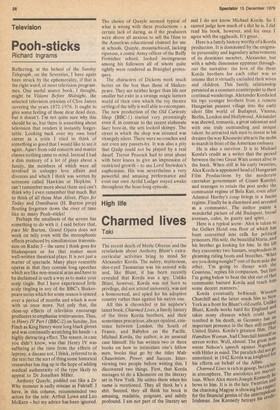Pooh-sticks
Richard Ingrams
Reflecting, at the behest of the Sunday Telegraph, on the Seventies, I have again been struck by the ephemerality, if that is the right word, of most television programmes. One useful source book, I thought, might be Visions Before Midnight, the selected television criticism of Clive James covering the years 1972-1976. It ought to give some feeling of those dear dead days, but it doesn't. I'm not quite sure why this should be so, but there is something about television that renders it instantly forgettable. Looking back over my own brief career as a critic I tried to think of something so good that I would like to see it again. Apart from odd concerts and master classes nothing came to mind. Instead I had a dim memory of a lot of plays about a family, the members of which were all involved in unhappy love affairs and divorces and which I think was written by someone called Hawkins or Hopkins. I can't remember more about them and can't think why I even remember that much. But to think of all those Man Alives, Plays for Today and Omnibuses (H. Burton prop) floating forgotten down the river of time like so many Pooh-sticks!
Perhaps the smallness of the screen has something to do with it. I said before that, pace Mr Burton, Grand Opera does not work on telly even with the stereophonic effects produced by simultaneous transmission on Radio 3 — the same I think goes for Shakespeare or for that matter most well-written theatrical plays. It is not just a matter of spectacle. Many plays resemble operas in that they contain long speeches which are like non-musical arias and have to be declaimed in such a way as to make your scalp tingle. But I have experienced little scalp tingling in any of the BBC's Shakespeare series which for some reason is spaced over a period of months and which is now with us once more. Not only that, the close-up effects of television encourage producers to emphasise irrelevancies. Thus, in Henry IV Part I (BBC-2) on Sunday, Jon Finch as King Henry wore long black gloves and was continually scratching his hands — a highly distracting effect. The reason, in case you didn't know, was that Henry IV was suffering at the time from the effects of leprosy, a disease not, I think, referred to in the text but the sort of thing some historical researcher has dug up in the hope of adding medical authenticity of the type likely to appeal to Dr Jonathan Miller.
Anthony Quayle, padded out like a Dr Who monster is sadly miscast as Falstaff. I have, in this column, recommended two actors for the role: Arthur Lowe and Leo McKern — but my advice has been ignored. The choice of Quayle seemed typical of what is wrong with these productions — a certain lack of daring, as if the producers were above all anxious to sell the films to the American educational channel for use in schools. Quayle, moustachioed, lacking ripeness, a comic Army officer of the Buffy Frobisher school, looked incongruous among his followers all of whom quite rightly were rendered as Brueghel grotesques.
The characters of Dickens work much better on the box than those of Shakespeare. They are neither larger than life nor smaller but exist in a strange magic lantern world of their own which the toy theatre setting of the telly is well able to encompass. The new production of the Old Curiosity Shop (BBC-I ) started very promisingly even if, in contrast to the recent elaborate Suez bore-in, the sets looked skimpy. The street in which the shop was situated was strangely silent. There were no coaches and not even any passers-by. It was also a pity that Quilp could not be played by a real dwarf. Trevor Peacock had to strut about with bent knees to give an impression of restricted growth — to use Lord Snowdon's euphemism. His was nevertheless a very powerful and amusing performance and even our own Artful Lodger stayed awake throughout the hour-long episode.


































 Previous page
Previous page